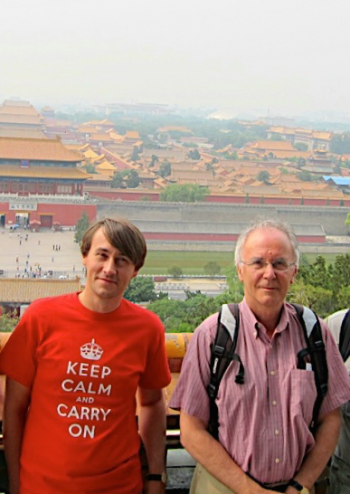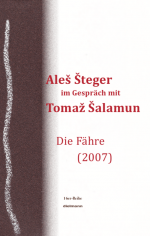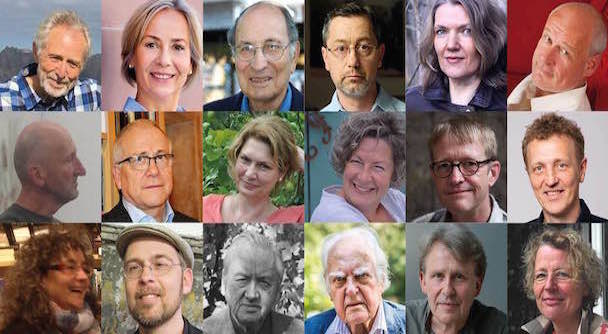Authors & Books
Aleš Šteger

In 2007, the author, translator and publisher Aleš Šteger, born in Ptuj in 1973, and Tomaž Šalamun, born in Zagreb in 1941, who grew up in Koper and is now one of the most important Slovenian poets, talked to each other. The result of their conversation is our little volume as part of the »BOX—the wilde Slovenes«.
Our photo (thanks to Aleš!) shows the two of them in 2009 at the Great Wall in China; in the background is the Forbidden City, Beijing.

Aleš Šteger talking to famous Tomaz Šalamun
- series 16ers
- hand-stitched
- 48 pages
- translated by Matthias Göritz
- title a sand-emery by Joši Bojz
- a volume in our
- BOX—the wild Slovenes
- at Slovenia as Guest of Honour 2023
978-3-86638-404-0

In 2007, the author, translator and publisher Aleš Šteger, born in Ptuj in 1973, and Tomaž Šalamun, born in Zagreb in 1941, who grew up in Koper and become one of the most important Slovenian poets, spoke to each other about their poetry and literary aesthetics.
The two exchange about the encounter with language, the understanding of poetic worlds and the place of poetry in the world, may be read as an extraordinarily rare moment of happiness. Because the moment of this conversation is savoured with the greatest possible openness and at the same time with unflinching precision and unfolds into numerous historical, social, poetological and personal dimensions.
Aleš: I have always envied you this ability to approach the word like a ready-made, or so it seemed to me. As if you were a big hand reaching into space, lifting something up and turning it over.
Tomaz: I find that hard to imagine, hard to understand. For me it's more as if a rift opens up or a tone, a tension that ruptures, and it's as if a ray then lights up or a sentence bursts forth. Like little horses galloping off together, dashing through it. I write it down quickly and then it's there - or sometimes I just can't and it disappears. I recognise the opening and the sentences for what they are and I have nothing to do with it. That's great.
Aleš: I find that difficult to imagine, difficult to understand. For me, it's more as if a rift opens up or a tone, a tension that breaks, and it's as if a ray then lights up or a sentence bursts forth. Like little horses galloping off together, hurtling through it. I write it down quickly and then it's there—or sometimes I just can't and it disappears. I recognise the opening and the sentences for what they are and I have nothing to do with it. That's great.
Tomaz: That's exactly what I'm talking about. This liberation of the river from the channel in which it flows. The freedom of the river. I don't even know if I am free or not. At a certain point I am a recipient of freedom. Sometimes I am simply speechless. Today your three pages of poetry were like fuel.








